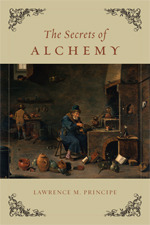You need to sign in or sign up before continuing.
Take a photo of a barcode or cover
An okey book book, with tons of information but I wished it included history until the present day~
Very readable introduction to alchemy’s development over the millennia and how the early modern worldview worked with regard to “natural philosophy,” etc. Good place to start if you’re curious about fact vs fiction in alchemy, what alchemists were actually doing in their labs, and so on.
informative
mysterious
reflective
medium-paced
informative
lighthearted
informative
relaxing
medium-paced
Among the many anecdotes in this fascinating history Principe reports how in the early 18th century an alchemist by the name of Johann Friedrich Bottger was arrested for attempting to change lead into gold in a demonstration reported by no less than Leibniz. While serving his sentenence for alchemy -- a discipline often outlawed in the pre-modern world to fight counterfeiting, and whose modern incarnation is no less regulated -- Bottger was commanded to reproduce 15th century Ming ceramics. Johann winds up spending his life in a dungeon serving as the court alchemist reverse engineering Chinese technology.
So it was quite startling when I followed up with Trevor Levere's history of the same subject, "Transforming Matter", and in the first chapter Chinese interest in chemistry is breezily discounted as ending after the 1st century due to the introduction of Buddhism, a repitition of old Joe Needham's thesis for his self-titled grand question about why the scientific revolution didn't take off in China, though Levere offers no footnote or citation for the blanket assertion.
Historians of science spent the first half of the 20th century on a sort of collective project of demolishing the Draper-White conflict thesis regarding Christianity, but as soon as they turned to look outside Europe they just reproduced it, whether it's Buddhism in east Asia or al-Ghazali's occasionalism in Islam or what have you. In this case I'm left scratching my head wondering why, if the Chinese lost all interest in chemistry 1400 years prior, were European chemists literally slaving away to copy Chinese chemistry, and European empires colonizing half the planet in their quest for cheaper access to its tchotchkes.
Principe doesn't address that problem directly, but at least he's not part of it. His research reproducing old alchemical experiments is rather riveting. With the anti-alchemical laws driving the literature to use obfuscatory jargon to merely interpret medieval alchemical texts is no small feat, but then to reverse engineer the actual experiments is astonishing, with Principe and his colleagues discovering how tiny particulars -- like the distinct composition of ores from particular quarries -- dictated the reported results and would confuse efforts to reproduce an experiment, helping to explain the Whiggish tendency to treat medieval alchemy as charlatan nonsense.
So it was quite startling when I followed up with Trevor Levere's history of the same subject, "Transforming Matter", and in the first chapter Chinese interest in chemistry is breezily discounted as ending after the 1st century due to the introduction of Buddhism, a repitition of old Joe Needham's thesis for his self-titled grand question about why the scientific revolution didn't take off in China, though Levere offers no footnote or citation for the blanket assertion.
Historians of science spent the first half of the 20th century on a sort of collective project of demolishing the Draper-White conflict thesis regarding Christianity, but as soon as they turned to look outside Europe they just reproduced it, whether it's Buddhism in east Asia or al-Ghazali's occasionalism in Islam or what have you. In this case I'm left scratching my head wondering why, if the Chinese lost all interest in chemistry 1400 years prior, were European chemists literally slaving away to copy Chinese chemistry, and European empires colonizing half the planet in their quest for cheaper access to its tchotchkes.
Principe doesn't address that problem directly, but at least he's not part of it. His research reproducing old alchemical experiments is rather riveting. With the anti-alchemical laws driving the literature to use obfuscatory jargon to merely interpret medieval alchemical texts is no small feat, but then to reverse engineer the actual experiments is astonishing, with Principe and his colleagues discovering how tiny particulars -- like the distinct composition of ores from particular quarries -- dictated the reported results and would confuse efforts to reproduce an experiment, helping to explain the Whiggish tendency to treat medieval alchemy as charlatan nonsense.
A great summary of some key alchemical thinkers as well as a general trajectory of the alchemical anthology from Egypt to Arabia to Europe and the key ideas and how they changed.
His chemical knowledge and recreation of some of the alchemical experiments complements his writing perfectly with its emphasis on demystifying alchemy and seeing the underlying scientific theories and practice undergirding it.
In that vein he does seem to somewhat underestimate the spiritual dimension that alchemy acquired due to its hermetic and Christian influences.
His chemical knowledge and recreation of some of the alchemical experiments complements his writing perfectly with its emphasis on demystifying alchemy and seeing the underlying scientific theories and practice undergirding it.
In that vein he does seem to somewhat underestimate the spiritual dimension that alchemy acquired due to its hermetic and Christian influences.
informative
medium-paced
informative
slow-paced
Somehow the author managed to create a Very boring book about a super interesting subject. The book would have been way more exciting if it shed some light on the world the early alchemists lived in. Where did they get their supplies? What other cool things did they invent? And then not just describing 'coincidentally they also found x' but going into more detail.
Main takeaways:
- the whole Alchemy as a spiritual dimension is a 19th century invention, but Alchemy and religion were closely intertwined as science and religion were too.
- the expression 'hermetically closed' refers to the last step of alchemy where the material is enclosed in a glass flask
- the alchemists did really cool actual chemical things but it's not easy to dechiper. That last part would have been lovely to read more about!
Main takeaways:
- the whole Alchemy as a spiritual dimension is a 19th century invention, but Alchemy and religion were closely intertwined as science and religion were too.
- the expression 'hermetically closed' refers to the last step of alchemy where the material is enclosed in a glass flask
- the alchemists did really cool actual chemical things but it's not easy to dechiper. That last part would have been lovely to read more about!
I’ve been whining about “where were all these books on alchemy last year when I was doing the primary research for The Mystic Marriage? In this case, the answer is “not published yet”. There does seem to be a nebulous “interest in alchemy” front passing through, which I can only hope will be positive for the reception of my novel. This is exactly the sort of readable but solidly historical general history of the field that I was searching for. (The best I could find last year was a bit too invested in the mystical aspects for true objectivity.) This goes on my “actually read it through” list.





